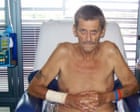
In the ever-evolving landscape of health and wellness, recent developments highlight both the remarkable strides made in medical treatments and the ongoing challenges in access and prevention that require mindful attention. As we navigate these changes, a calm yet determined focus on progress and the need for support in healthcare decisions becomes ever more crucial.
A beacon of hope has emerged in the form of breakthroughs in hepatitis treatment, offering a renewed lease on life for many. The poignant story of David Clune exemplifies the transformative impact of medical advancements. Diagnosed in 1989 with hepatitis B and C, Clune feared the loss of precious moments with his family. Thanks to cutting-edge treatments, his life took a positive turn, underscoring the potential for modern medicine to change lives dramatically. However, this optimistic narrative is tempered by a sobering reality: many individuals remain unaware of hepatitis risks or encounter barriers to necessary healthcare. This gap calls for enhanced efforts to educate the public and improve healthcare accessibility, ensuring that life-saving treatments are within reach for all who need them.
Meanwhile, a controversy has surfaced in the realm of preventive healthcare in the United States, stemming from reported plans by Robert F. Kennedy Jr. to alter the US Preventive Services Task Force. Concern has been expressed by the American Medical Association over these potential changes, fearing they might disrupt the critical guidance on preventive health measures, including vital cancer screenings. The AMA’s call for consideration emphasizes the essential role of evidence-based guidelines that protect and promote public health. As the discourse unfolds, it serves as a reminder of the significant impact that policy decisions can have on community health and the necessity for thoughtful, balanced approaches that prioritize well-being over political labels.
In contrast to these detailed health sector developments, a more personal and societal reflection arises from an urgent call for addressing childhood anxiety. The contemporary debate on children’s wellbeing touches upon the delicate balance between providing structured guidance and fostering their ability to engage in independent play. The reminder here is that healthy development often involves learning resilience and adapting to both solitary and social play environments, which can ease anxieties and nurture holistic growth.
The interconnected themes present in these stories underline the intricate tapestry of modern health and wellness. Each narrative, while distinct, contributes to a wider understanding of the pursuit of a better quality of life—whether through medical innovation, protective policies, or nurturing environments. Together, they remind us that health is not simply the absence of illness but an active, inclusive journey towards holistic well-being. As global health narratives continue to unfold, there is a collective need to embrace advancements thoughtfully and ensure that no one is left behind in the quest for a healthier world.
Source: {link}
